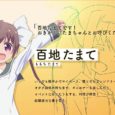Animation is something that bends in many directions, in many different styles but I think it can be agreed upon that the Japanese out of everybody have learned to bend it into pure submission. There is no better evidence of this mastery than the short but entirely poignant 2013 short film The Garden of Words (言の葉の庭, Kotonoha no Niwa) by Makoto Shinkai.
I know a lot of people interested in animation or at least those who are fans of say Disney or Studio Ghibli seem to be constantly in a CG vs. Traditional hand-drawn debate. This debate is in my opinion rather moot because today there are people like Makoto Shinkai that are seamlessly blending everything together or utilizing CGI in such a manner that compliments and looks traditional, but even better. One more familiar with the actual technical processes I’m sure can pick out what they exactly did but The Garden of Words (言の葉の庭, Kotonoha no Niwa) is visually perplexing. It is not just a feast for the eyes but an absolute glut; blending painted scenery, traditional animation, and CGI, cell shading, rotoscoping all together. Where one medium starts and stops is very ambiguous even the traditionally animated characters at times seem rendered over with CGI accents and touches. It leaves one baffled and may ruin live action films for not being this utterly gorgeous or artful. The film is riddled with technically ingenious cinematography and framing and effects such as tilt-shift effect, light flares, strong use of focus and then unique camera angles that both borrow from live action film and then completely original shots I don’t think I’ve ever seen in anything before.
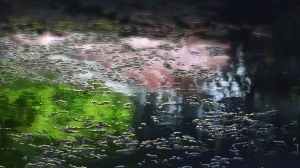
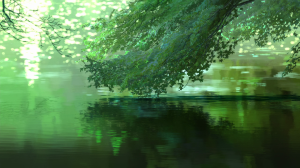
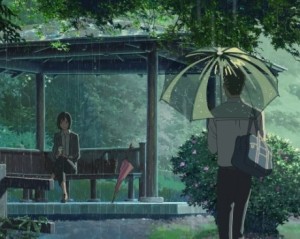
This is a film that must be seen in motion. The film is entirely atmospheric full of ambient sounds of nature and a sparse but beautiful score by Daisuke Kashiwa. But above all there is the sound of rain. This film is absolutely drenched in water. Rain is the true star of the film, both visually in it’s implementation and its narrative tied role in the ritual a young 15 year old student Takao Akizuki, an aspiring shoemaker (yes that’s right a shoemaker) starts when he skips morning classes and meets an older woman (she’s 27) sitting alone under a covered rest area in the park and continues to return each morning it rains.
The story is on the surface a simple one (and in fact rather timeless in structure and content; this could be set in relatively different time periods) but when looked at closer you have a story jammed with metaphors and recurring themes. This is a film about crossroads in ones life; childhood vs adulthood, the natural world of the former vs the cold organized world of the latter and the corresponding transition and struggle between the two and the leads own personal struggles finding their place in or between the two realms all the while learning to get back up on one’s feet from failure. It is fairytale-like, but melancholic in the introspective bittersweet manner of Let Petit Prince (which appears in the film upon a bookshelf) than a happy Cinderella type of affair. In fact it is very literary both thematically and in execution. This is Japanese sentimentalism found in much of their literature. It is also a great example of, ultimately, “mono no aware” or the awareness of impermanence of things and the sadness at their ending or passing on. This awareness makes the time spent, objects or things that much more beautiful. This is often tied to yearly blossoming of flowers (sakura, cherry blossoms) who only last a few weeks and the coming and going of seasons and indeed we get a classic cycle of seasons and then some in this film.
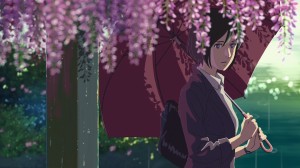
A lot of the character’s reactions and actions I can only describe as very Japanese so any English viewers who watch it and feel like the people are acting strange (as I’ve seen in other reviews) in how they react to stuff or act with each other, keep in mind the cultural differences in how they deal with problems. Otherwise pay attention to what people say; nothing in the film is throw-away and dialogue is heavy with symbolism. Being said the film is ridiculously short at only 46 minutes long so it while easily watchable, beware as it packs a truly emotional and visceral punch for something so brief.
Overall with it’s introspective classic literary nature, abstract visuals and overall bittersweet feel and short length The Garden of Words is more like an animated short story or classic romance novella with it’s concentrated potency. Whether you want to watch it for its beautiful visuals or for the story, I recommend either, watch it for both it’s that good, you’ll be stunned either way. A must watch.
Meet you when it rains;
Max Eber
Staff Writer/The Doctor
max@ihogeek.com
Twitter: @maxlikescomics




